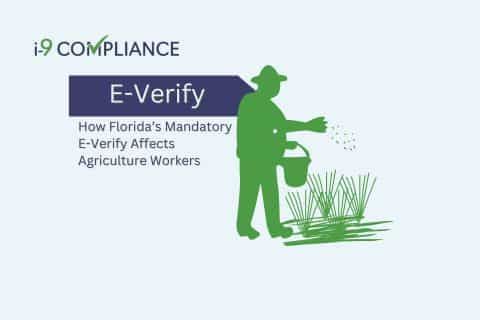How Florida’s Mandatory E-Verify Affects Agriculture Workers

August 3, 2023
Florida’s mandate for private employers to use E-Verify took effect on July 1, 2023. However, some employers have reported a shortage of workers less than a month after its implementation. Many raised concerns about the law’s impact on the ability to acquire employees, like in the agriculture sector.
One Florida lawmaker believed the law applied only to permanent employees. However, this interpretation does not resolve the issue plaguing employers. This law penalizes all employers who hire individuals without authorization to work in the United States. Though the law offers a provision concerning permanent positions, it lacks a definition for the phrase. Consequently, the decision of whether it applies to seasonal workers may fall onto the courts.
Though the law includes two exceptions, neither specifically mentions seasonal workers. Instead, it states, “An individual hired for casual labor, as defined in s. 443.036, which is to be performed entirely within a private residence, is not an employee of an occupant or owner of a private residence. An independent contractor, as defined in federal laws or regulations, hired to perform a specified portion of labor or services is not an employee.”
These are the only exceptions to the E-Verify requirements in the law. However, the E-Verify provisions do not apply to private employers with less than 25 employees. In addition, the conditions for a permanent position and that an employer has 25 or more employers apply only to the E-Verify section of the law.
Many have complained about other parts of the law, such as what applies when hiring an ineligible individual. This example concerns individuals unable to work in the U.S. or obtain work using fraudulent identification. Questions about whether these issues applied regardless of the permanence of the job or the number of employees working in the company have circulated due to the law’s vagueness.
Once again, the confusion encompasses seasonal workers.
Overall, experts disagree on whether the E-Verify requirement covers seasonal workers. However, not all agricultural workers work seasonally. Regardless of whether the law applies to seasonal workers, it will still regulate most agricultural employees.
As such, agricultural employers must ensure they comply with the law. The best way to ensure compliance concerning this and other regulations is to use an electronic I-9 management system with E-Verify integration. This system guides employers through the employment eligibility verification process. It also safely and securely stores the forms and documentation.
When it comes to your work, automation makes eligibility verification quick and seamless. Get a head start today with I-9 Compliance.